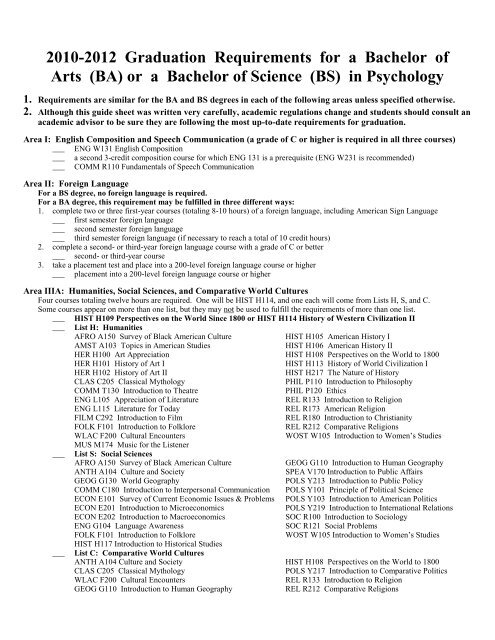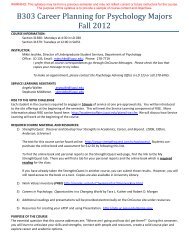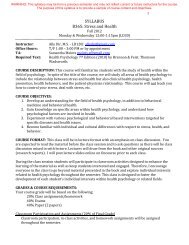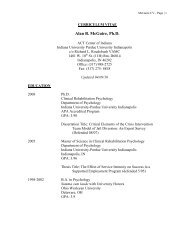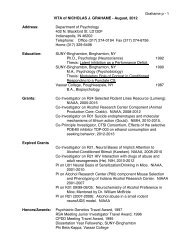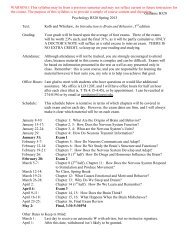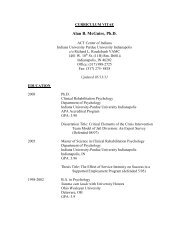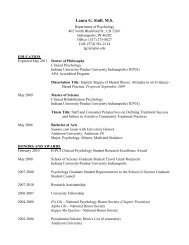Degree Checksheet - Psychology @ IUPUI
Degree Checksheet - Psychology @ IUPUI
Degree Checksheet - Psychology @ IUPUI
You also want an ePaper? Increase the reach of your titles
YUMPU automatically turns print PDFs into web optimized ePapers that Google loves.
2010-2012 Graduation Requirements for a Bachelor of<br />
Arts (BA) or a Bachelor of Science (BS) in <strong>Psychology</strong><br />
1. Requirements are similar for the BA and BS degrees in each of the following areas unless specified otherwise.<br />
2. Although this guide sheet was written very carefully, academic regulations change and students should consult an<br />
academic advisor to be sure they are following the most up-to-date requirements for graduation.<br />
Area I: English Composition and Speech Communication (a grade of C or higher is required in all three courses)<br />
___ ENG W131 English Composition<br />
___ a second 3-credit composition course for which ENG 131 is a prerequisite (ENG W231 is recommended)<br />
___ COMM R110 Fundamentals of Speech Communication<br />
Area II: Foreign Language<br />
For a BS degree, no foreign language is required.<br />
For a BA degree, this requirement may be fulfilled in three different ways:<br />
1. complete two or three first-year courses (totaling 8-10 hours) of a foreign language, including American Sign Language<br />
___ first semester foreign language<br />
___ second semester foreign language<br />
___ third semester foreign language (if necessary to reach a total of 10 credit hours)<br />
2. complete a second- or third-year foreign language course with a grade of C or better<br />
___ second- or third-year course<br />
3. take a placement test and place into a 200-level foreign language course or higher<br />
___ placement into a 200-level foreign language course or higher<br />
Area IIIA: Humanities, Social Sciences, and Comparative World Cultures<br />
Four courses totaling twelve hours are required. One will be HIST H114, and one each will come from Lists H, S, and C.<br />
Some courses appear on more than one list, but they may not be used to fulfill the requirements of more than one list.<br />
___ HIST H109 Perspectives on the World Since 1800 or HIST H114 History of Western Civilization II<br />
___ List H: Humanities<br />
AFRO A150 Survey of Black American Culture<br />
HIST H105 American History I<br />
AMST A103 Topics in American Studies<br />
HIST H106 American History II<br />
HER H100 Art Appreciation HIST H108 Perspectives on the World to 1800<br />
HER H101 History of Art I<br />
HIST H113 History of World Civilization I<br />
HER H102 History of Art II<br />
HIST H217 The Nature of History<br />
CLAS C205 Classical Mythology<br />
PHIL P110 Introduction to Philosophy<br />
COMM T130 Introduction to Theatre<br />
PHIL P120 Ethics<br />
ENG L105 Appreciation of Literature<br />
REL R133 Introduction to Religion<br />
ENG L115 Literature for Today<br />
REL R173 American Religion<br />
FILM C292 Introduction to Film<br />
REL R180 Introduction to Christianity<br />
FOLK F101 Introduction to Folklore<br />
REL R212 Comparative Religions<br />
WLAC F200 Cultural Encounters<br />
WOST W105 Introduction to Women’s Studies<br />
MUS M174 Music for the Listener<br />
___ List S: Social Sciences<br />
AFRO A150 Survey of Black American Culture<br />
GEOG G110 Introduction to Human Geography<br />
ANTH A104 Culture and Society<br />
SPEA V170 Introduction to Public Affairs<br />
GEOG G130 World Geography<br />
POLS Y213 Introduction to Public Policy<br />
COMM C180 Introduction to Interpersonal Communication POLS Y101 Principle of Political Science<br />
ECON E101 Survey of Current Economic Issues & Problems POLS Y103 Introduction to American Politics<br />
ECON E201 Introduction to Microeconomics<br />
POLS Y219 Introduction to International Relations<br />
ECON E202 Introduction to Macroeconomics<br />
SOC R100 Introduction to Sociology<br />
ENG G104 Language Awareness<br />
SOC R121 Social Problems<br />
FOLK F101 Introduction to Folklore<br />
WOST W105 Introduction to Women’s Studies<br />
HIST H117 Introduction to Historical Studies<br />
___ List C: Comparative World Cultures<br />
ANTH A104 Culture and Society HIST H108 Perspectives on the World to 1800<br />
CLAS C205 Classical Mythology<br />
POLS Y217 Introduction to Comparative Politics<br />
WLAC F200 Cultural Encounters<br />
REL R133 Introduction to Religion<br />
GEOG G110 Introduction to Human Geography<br />
REL R212 Comparative Religions
Area IIIC: Physical and Biological Sciences (four courses totaling at least 12 credit hours including one lab<br />
course, each of these courses must be at least 3 credit hours)<br />
For a BA degree: four astronomy, biology, chemistry, forensic science, geology, or physics courses*<br />
____ astronomy, biology, chemistry, forensic science, geology, or physics course with a lab<br />
____ astronomy, biology, chemistry, forensic science, geology, or physics course<br />
____ astronomy, biology, chemistry, forensic science, geology, or physics course<br />
____ astronomy, biology, chemistry, forensic science, geology, or physics course<br />
For a BS degree: four astronomy, biology, chemistry, forensic science, geology, or physics courses (two must be biology<br />
and/or chemistry courses)*<br />
____ astronomy, biology, chemistry, forensic science, geology, or physics course with a lab<br />
____ astronomy, biology, chemistry, forensic science, geology, or physics course<br />
____ biology or chemistry course<br />
____ biology or chemistry course<br />
* The following courses do not fulfill this requirement: AST A130, BIOL N100, BIOL N120, BIOL N200, BIOL N222, CHEM<br />
C100, FIS 20500, GEOL G130, PHYS 010, PHYS 140, PHYS 200, and all agricultural courses. GEOG G107 and G108 will fulfill<br />
this requirement. BIOL N120 The Biology of Mental Illness may be taken by psychology majors as an elective.<br />
Area IIID: Mathematics and Computer Science<br />
For a BA degree<br />
___ one three-credit math course including M118, M119, or 153 or above (M118 is recommended*)<br />
___ one computer science course (CSCI N207 is recommended)**<br />
For a BS degree<br />
___ MATH M118 (recommended) ___ MATH 163 or above<br />
and or and<br />
___ MATH M119 (recommended) ___ MATH 164 or above<br />
___ one computer science course (CSCN N207 is recommended)**<br />
* It is possible to test out of M118 and M119; please contact the Math Department for details.<br />
Please read item 14 under General Requirements in the School of Science section of the Bulletin to avoid losing credits for taking<br />
“overlapping” math courses.<br />
** Neither CSCN N100 nor CSCI N241 will fulfill this requirement.<br />
A student may have a grade of D or D+ in only one course that satisfies this requirement; all other grades must be C- or higher.<br />
Area IV: Major Courses for <strong>Psychology</strong> Majors (40 credit hours required)<br />
Introductory Courses (all three of the following courses are required)<br />
___ B103 Orientation to a Major in <strong>Psychology</strong><br />
___ B104 <strong>Psychology</strong> as a Social Science<br />
___ B105 <strong>Psychology</strong> as a Biological Science<br />
Methods Courses (both of the following courses are required)<br />
___ B305 Statistics<br />
___ B311 Introductory Laboratory in <strong>Psychology</strong><br />
Core Courses (six from the following twelve courses are required)<br />
___ B307 Tests and Measurement ___ B370 Social <strong>Psychology</strong> ___ B334 Perception<br />
___ B310 Life Span Development ___ B380 Abnormal <strong>Psychology</strong> ___ B340 Cognition<br />
___ B320 Behavioral Neuroscience ___ B424 Theories of Personality ___ B344 Learning<br />
___ B358 Industrial/Organizational <strong>Psychology</strong> ___ B398 Brain Mechanisms of Behavior ___ B356 Motivation<br />
Specialization Courses (any two different-numbered 300-level or above psychology courses that total at least six credit hours)<br />
___ First 300-level or above specialization course<br />
___ Second 300-level or above specialization course<br />
Students may earn a concentration in an area of specialization in psychology (i.e., Behavioral Neuroscience, Clinical<br />
<strong>Psychology</strong>, Industrial/Organizational <strong>Psychology</strong>, or the <strong>Psychology</strong> of Addictions) by completing a specific set of core,<br />
specialization, and capstone courses. You may obtain detailed information about these concentrations from the <strong>Psychology</strong><br />
Advising Office located in LD 123.<br />
Capstone Course (one of the following courses is required)<br />
____ For the BA degree (any of the following courses)<br />
B433 Capstone Lab in Applied <strong>Psychology</strong><br />
B454 Capstone Seminar in <strong>Psychology</strong>*<br />
B462 Capstone Practicum in Industrial/Organizational <strong>Psychology</strong>*<br />
B482 Capstone Practicum in Clinical <strong>Psychology</strong>*<br />
B471 Capstone Lab in Social <strong>Psychology</strong><br />
B499 Capstone Honors Research<br />
____ For the BS degree (any of the above courses except those marked with an *)<br />
Area V: Electives<br />
Students may choose the remainder of their 124 required credit hours from any <strong>IUPUI</strong> department, but no more than 6 credit hours of<br />
studio, clinical, athletic, or performing arts course work will be approved as electives unless they fulfill the requirements for a second<br />
major, a minor, or a certificate.


